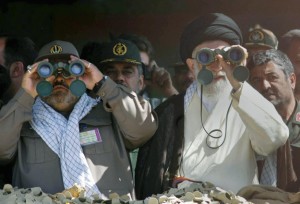 Mohamad Bazzi, Adjunct Senior Fellow for Middle Eastern Studies, CFR
Mohamad Bazzi, Adjunct Senior Fellow for Middle Eastern Studies, CFR
August 30, 2010
GlobalPost
BEIRUT, Lebanon — In February 2003, as he marshaled the United States for war, President George W. Bush declared: “A new regime in Iraq would serve as a dramatic and inspiring example of freedom for other nations in the region.”
Now, as the U.S. military concludes its combat role — which President Barack Obama will formally announce from the Oval Office on Tuesday — Iraq is indeed a dramatic example for the Middle East, but not in the ways that Bush and his administration envisioned. Iraq did not become a beacon of democracy, nor did it create a domino effect that toppled other dictatorial regimes in the Arab world. Instead, the Iraq war has unleashed a new wave of sectarian hatred and upset the Persian Gulf’s strategic balance, helping Iran consolidate its role as the dominant regional power.
The Bush administration argued that its goal was to protect U.S. interests and security in the long run. But the region is far more unstable and combustible than it was when U.S. forces began their march to Baghdad seven years ago. Throughout the Middle East, relations between Sunnis and Shiites are badly strained by the sectarian bloodletting in Iraq. Sunnis are worried about the regional ascendance of the Shiite-led regime in Iran; its nuclear program; its growing influence on the Iraqi leadership; and its meddling in other countries with large Shiite communities, especially Lebanon.
Iran is the biggest beneficiary of the American misadventure in Iraq. The U.S. ousted Tehran’s sworn enemy, Saddam Hussein, from power. Then Washington helped install a Shiite government for the first time in Iraq’s modern history. As U.S. troops became mired in fighting an insurgency and containing a civil war, Iran extended its influence over all of Iraq’s Shiite factions.
Today’s Middle East has been shaped by several proxy wars. In Iraq, neighboring Sunni regimes backed Sunni militants, while Iran supported Shiite militias. In Lebanon, an alliance between Washington and authoritarian Sunni Arab regimes — Egypt, Jordan, Saudi Arabia and other Persian Gulf countries — backed a Sunni-led government against Hezbollah, a Shiite militia funded by Iran. And in the Palestinian territories, Iran and Syria supported the militant Hamas, while the U.S. and its Arab allies backed Palestinian President Mahmoud Abbas and his Fatah movement.
In 2007, at the height of the insurgency and sectarian conflict in Iraq, I went to see Marwan Kabalan, a political scientist at Damascus University. He explained the regional dynamics better than anyone else. “Everyone is fighting battles through local proxies. It’s like the Cold War,” he told me. “All regimes in the Middle East recognize that America has lost the war in Iraq. They’re all maneuvering to protect their interests and to gain something out of the American defeat.”
With U.S. influence waning and Iran ascendant, Iraq’s other neighbors are still jockeying to gain a foothold with the new government in Baghdad. For example, Saudi Arabia’s ruling Al-Saud dynasty views itself as the rightful leader of the Muslim world, but Iran is challenging that leadership right now. Although Saudi Arabia has a Sunni majority, its rulers fear Iran’s potential influence over a sizable and sometimes-restive Shiite population concentrated in the kingdom’s oil-rich Eastern Province. In Bahrain (another American ally in the Persian Gulf), the Shiite majority is chafing under Sunni rulers who also fear Iran’s reach.
Even worse, the brutal war between Iraq’s Shiite majority and Sunni minority unleashed sectarian hatreds that are difficult to contain. This blowback has been most keenly felt in Lebanon, a small country with a history of religious strife. During Lebanon’s 15-year civil war, which ended in 1990, the sectarian divide was between Muslims and Christians. This time, the conflict is mainly between Sunnis and Shiites — and it is fueled, in part, by the bloodbath in Iraq.
http://www.globalpost.com/dispatch/worldview/100829/iraq-war-iran-US-military











